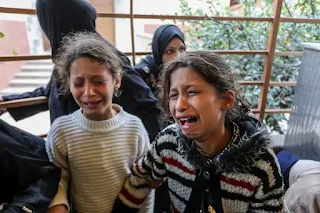All this is taking place under the weight of a genocidal war waged by Israel for 20 months, with American support, against some 2.4 million Palestinians in the besieged Gaza Strip.
This year, Palestinians are celebrating Eid al-Adha without new clothes, no sacrificial animals, and no children's joy in the markets. Most families have been displaced after Israel destroyed their homes and are now living in dilapidated tents that offer neither protection from the summer heat nor the winter cold, and offer neither privacy nor dignity.
By deliberately starving the Palestinians, paving the way for forced displacement, Israel, according to the United Nations, has pushed the Palestinians toward famine by closing the crossings to humanitarian aid, particularly food.
On Thursday, the UN Special Rapporteur on the Right to Food, Michael Fakhri, said that Israel has pushed Gaza to the "most dangerous stage of starvation." He warned that the effects of starvation will last for generations, stressing that what is happening in the Strip constitutes "genocide, starvation, a crime against humanity, and a gross violation of human rights."
The largest prison in the world
The holiday decorations are gone, replaced by the rubble of homes and the remains of Israeli missiles. Whereas residents used to decorate the entrances to neighborhoods and homes and write Eid greetings on the walls, the walls have now been reduced to rubble, and with them the signs of joy have disappeared.
Before the war, sacrificial offerings filled the streets, Eid joy filled the air, and markets teemed with shoppers buying clothes and gifts. Today, however, these manifestations have faded under the weight of an unprecedented economic and living collapse, leaving Gaza mired in siege, destruction, and bloodshed.
Israel has turned Gaza into the world's largest prison, besieging it for 18 years. The war of extermination has forced nearly two million of its citizens to flee their homes in tragic conditions, with deliberate shortages of food, water, and medicine.
"What joy?"
Nihad Abu Amsha, a Palestinian woman who supports seven children, said she has been displaced from her home in the Jabalia camp (north) several times, and before Eid she couldn't even find a pair of shoes for her child. She added, "Eid is a joy, but what kind of joy? The war has stolen the children's joy."
Abu Amsha, who lives with her children in a tent, continues: "All day long, my child says he's hungry, unable to stand, and dizzy." She adds: "There is no joy in Gaza. In every home there is a martyr or wounded person, and others are suffering from hunger, pain, and suffering. Some have lost their children, and some have had their homes demolished."
She added: "This Eid is a cry and a catastrophe. We are a stricken people. There is no Eid or joy, no water or food. There are those who beg for a loaf of bread." She continued: "For seven months I have not cooked basic food, and on Eid there are no sweets, no clothes, and no meat as there was before."
Hunger kills children
While Palestinian Adel Shamiya (79 years old) said: "We are in the worst situation we have ever experienced in my life, with a lack of food and water." Shamiya added: "Children are dying of hunger. This is the worst Eid we have experienced in light of the war."
Since October 7, 2023, 60 Palestinian children have died as a result of malnutrition caused by the ongoing Israeli blockade, according to the latest figures from the Ministry of Health.
Adel Shamiya, a displaced person from Beit Hanoun (north), continued: "The Eid atmosphere is gloomy. Before the war, we used to make the children happy, but today there is no joy." He continued: "We cannot find food or sacrifices. A kilo of flour costs 80 shekels (about $23). What kind of Eid can it be?"
The wish to return
The situation is no different for displaced Aisha Abu Salah (72 years old), who lives in a tent that lacks the most basic necessities of life, amid a difficult health situation. She said: “In the past, we used to give Eidiya and slaughter sacrificial animals, but today I can’t even find a bowl of soup to eat,” wishing to return to her home “even if I live on its soil.”
Eid al-Fitr comes to Gaza at a time when citizens are struggling daily to secure the bare minimum of survival, amidst ongoing bombardment, widespread destruction, a lack of income, and an absence of humanitarian aid.
Since October 7, 2023, Israel has been waging a war of genocide in Gaza, including killing, starvation, destruction, and forced displacement, ignoring all international calls and orders from the International Court of Justice to halt it.
The genocide left more than 178,000 Palestinians dead and wounded, most of them children and women, and more than 11,000 missing, in addition to hundreds of thousands of displaced persons and a famine that killed many, including children.
For decades, Israel has occupied Palestine and territories in Syria and Lebanon, and refuses to withdraw from these territories and establish an independent Palestinian state with East Jerusalem as its capital, along the pre-1967 borders.




